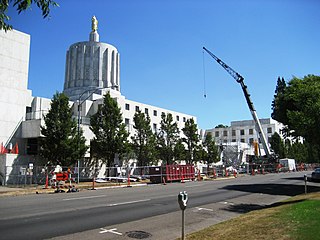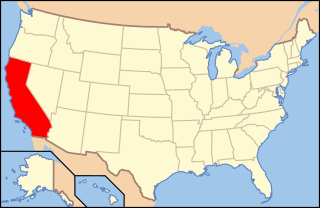The Oregon Family Fairness Act is a state law in the U.S. state of Oregon that made domestic partnerships legal in Oregon. [1] [2] The bill was introduced into the House by state Democrats. The bill adopted the term "domestic partnership" to describe these unions; the terms "marriage" or "civil union" were absent.
This bill enjoyed a relatively easy passage through the legislature, when compared to its 2005 predecessor. Passed by the House on April 17, 2007 (by a vote of 34-26) and by the Senate on May 2, 2007 (by a vote of 21-9), Governor Ted Kulongoski signed the Oregon Family Fairness Act on May 9, 2007. The law was scheduled to take effect January 1, 2008, but was delayed by a preliminary injunction until after a hearing on February 1, 2008, where the injunction was lifted. Domestic partnerships became effective from February 4, 2008.

A civil union is a legally recognized arrangement similar to marriage, created primarily as a means to provide recognition in law for same-sex couples. Civil unions grant some or all of the rights of marriage.
A domestic partnership is an intimate relationship between people, usually couples, who live together and share a common domestic life but who are not married. People in domestic partnerships receive legal benefits that guarantee right of survivorship, hospital visitation, and other rights.
A California domestic partnership is a legal relationship, analogous to marriage, created in 1999 to extend the rights and benefits of marriage to same-sex couples. It was extended to all opposite-sex couples as of January 1, 2016 and by January 1, 2020 to include new votes that updated SB-30 with more benefits and rights to California couples choosing domestic partnership before their wedding. California Governor Newsom signed into law on July 30, 2019.
This article contains a timeline of significant events regarding same-sex marriage and legal recognition of same-sex couples worldwide. It begins with the history of same-sex unions during ancient times, which consisted of unions ranging from informal and temporary relationships to highly ritualized unions, and continues to modern-day state-recognized same-sex marriage. Events concerning same-sex marriages becoming legal in a country or in a country's state are listed in bold.
Oregon has registered domestic partnerships between same-sex couples since 2008 and has expanded the law to begin registering partnerships between opposite-sex couples in 2024.
In the United States, domestic partnership is a city-, county-, state-, or employer-recognized status that may be available to same-sex couples and, sometimes, opposite-sex couples. Although similar to marriage, a domestic partnership does not confer any of the myriad rights and responsibilities of marriage afforded to married couples by the federal government. Domestic partnerships in the United States are determined by each state or local jurisdiction, so there is no nationwide consistency on the rights, responsibilities, and benefits accorded domestic partners.
Same-sex marriage has been legal in Estonia since 1 January 2024. The government elected in the March 2023 election, led by Prime Minister Kaja Kallas and consisting of the Reform Party, the Social Democrats and Estonia 200, vowed to legalize same-sex marriage. Legislation to open marriage to same-sex couples was introduced to the Riigikogu in May 2023, and was approved in a final reading by 55 votes to 34 on 20 June. It was signed into law by President Alar Karis on 27 June, and took effect on 1 January 2024. Estonia was the first Baltic state, the twentieth country in Europe, and the 35th in the world to legalise same-sex marriage.
In response to court action in a number of states, the United States federal government and a number of state legislatures passed or attempted to pass legislation either prohibiting or allowing same-sex marriage or other types of same-sex unions.
This is a list of notable events in the history of LGBT rights that took place in the year 2007.
The Employee Free Choice Act is the name for several legislative bills on US labor law which have been proposed and sometimes introduced into one or both chambers of the U.S. Congress.
This is a list of notable events in the history of LGBT rights that took place in the year 2008.

The Seventy-fourth Oregon Legislative Assembly was the Oregon Legislative Assembly (OLA)'s period from 2007 to 2008. There was a regular session in 2007, and a shorter special session in 2008.
Same-sex marriage has been legally recognized in Nevada since October 9, 2014, when a federal district court judge issued an injunction against enforcement of Nevada's same-sex marriage ban, acting on order from the Ninth Circuit Court of Appeals. A unanimous three-judge panel of the Ninth Circuit had ruled two days earlier that the state's ban on same-sex marriage was unconstitutional. Same-sex marriage was previously banned by an amendment to the Constitution of Nevada approved in 2002. The statutory and constitutional bans were repealed in 2017 and 2020, respectively.

The 2009 Washington Referendum 71 (R-71) legalized domestic partnership in Washington state, the first statewide referendum in the United States that extended to LGBT people the rights and responsibility of domestic partnership. The bill had passed State Legislature, and it was signed into law by the Governor in May 2009, but opponents gathered enough signatures to put the measure before the voters, who returned ballots by mail over three weeks ending on November 3, 2009, approving the measure 53% to 47%. The new law went into effect 30 days later, on December 3, 2009.
This is a list of events in 2011 that affected LGBT rights.

California is seen as one of the most liberal states in the U.S. in regard to lesbian, gay, bisexual, transgender, and queer (LGBTQ) rights, which have received nationwide recognition since the 1970s. Same-sex sexual activity has been legal in the state since 1976. Discrimination protections regarding sexual orientation and gender identity or expression were adopted statewide in 2003. Transgender people are also permitted to change their legal gender on official documents without any medical interventions, and mental health providers are prohibited from engaging in conversion therapy on minors.

The state of Washington is seen as one of the most progressive states in the U.S. in regard to lesbian, gay, bisexual, transgender and queer (LGBTQ) rights; with jurisprudence having evolved significantly since the late 20th century. Same-sex sexual activity was legalized in 1976. LGBTQ people are fully protected from discrimination in the areas of employment, housing and public accommodations; the state enacting comprehensive anti-discrimination legislation regarding sexual orientation and gender identity in 2006. Same-sex marriage has been legal since 2012, and same-sex couples are allowed to adopt. Conversion therapy on minors has also been illegal since 2018.

Lesbian, gay, bisexual, and transgender, and queer (LGBTQ) people in the U.S. state of Oregon have the same legal rights as non-LGBTQ people. Same-sex sexual activity is legal in Oregon, and same-sex marriage has been legal in the state since May 2014 when a federal judge declared the state's ban on such marriages unconstitutional. Previously, same-sex couples could only access domestic partnerships, which guaranteed most of the rights of marriage. Additionally, same-sex couples are allowed to jointly adopt, and discrimination based on sexual orientation and gender identity in the areas of employment, housing and public accommodations is outlawed in the state under the Oregon Equality Act, enacted in 2008. Conversion therapy on minors is also illegal.
Same-sex marriage has been legal in Tennessee since the U.S. Supreme Court's ruling in Obergefell v. Hodges on June 26, 2015. Governor Bill Haslam quickly announced that the state would abide by the court's decision, and same-sex couples began to marry in Tennessee. Previously, Tennessee had banned same-sex marriage both by statute and its State Constitution.

Arnold Schwarzenegger was an early opponent of same-sex marriage in the United States, including during his Governorship of California. As an elected official he opposed legal recognition of same-sex marriage but otherwise he supported LGBT rights legislation, including civil unions.